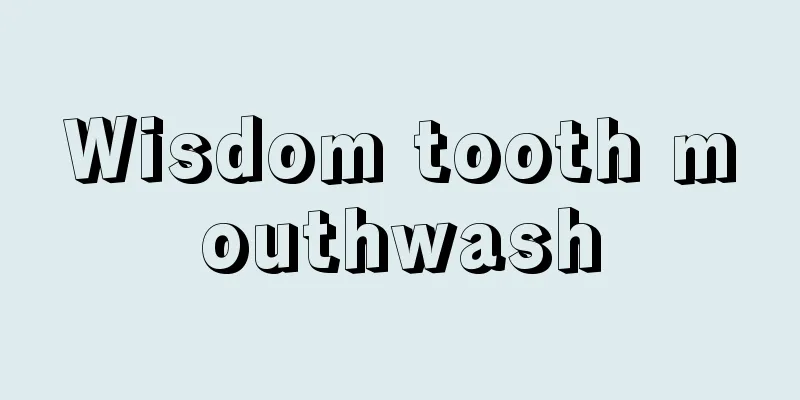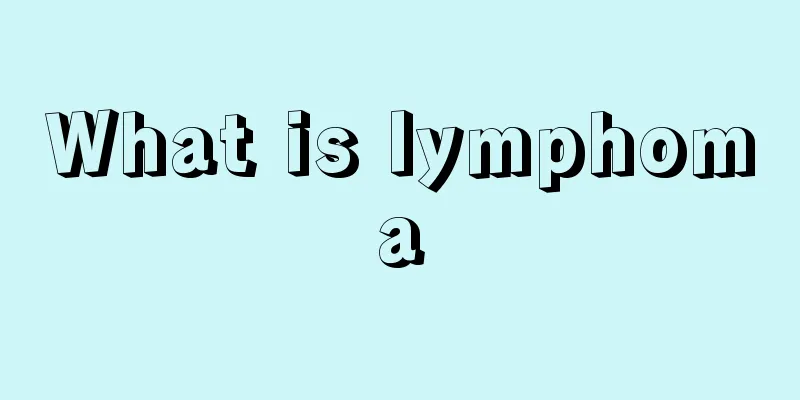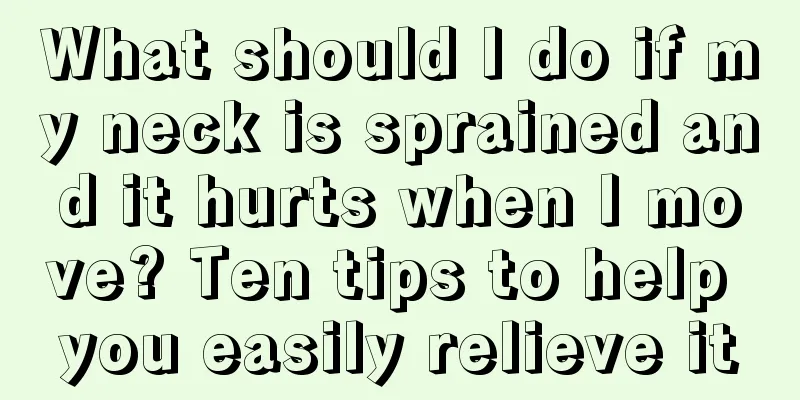Wisdom tooth mouthwash

|
Although wisdom teeth are a very common phenomenon, not everyone's wisdom teeth are healthy, and most people need to have their wisdom teeth removed. Tooth extraction will be painful for a while, and you also need to perform oral care to prevent bacterial infection. Using mouthwash after wisdom teeth removal is a good choice. If you cannot brush your teeth during the day, it is best to have mouthwash ready at all times and use it after meals. It can kill bacteria and protect oral hygiene. 1. How to determine whether wisdom teeth should be extracted 1. Is there any pain? Except for the pain caused by the eruption of wisdom teeth, there is no need to extract them if there is no pain in other situations. If wisdom teeth repeatedly cause pain and fever, they should be removed even if they are growing normally. 2. Whether it affects other teeth There is a type of wisdom tooth called "impacted wisdom tooth". As humans evolve, the upper and lower jaws become shorter and shorter, but the number of teeth does not decrease, resulting in no space for the third molars, or wisdom teeth, to erupt normally. This will cause the wisdom teeth to be crooked, tilted, or lying sideways, which will not only cause pain when they erupt, but will also squeeze other teeth. Even if they erupt, they will cause wear and tear on the oral mucosa. Therefore, such wisdom teeth need to be extracted before they erupt or just after they erupt. If you want to know whether your wisdom teeth are impacted, you can take an X-ray to see it at a glance. 3. Do wisdom teeth cause periodontal problems? If wisdom teeth cause cavities, tooth decay, or periodontitis, they need to be removed, even if they do not cause pain. 4. Is there a cleaning problem? Wisdom teeth are located inward and their shapes are often irregular. If not cleaned thoroughly, they can cause bad breath, tooth decay, and hide food debris. It is also recommended to remove them. 5. Does it affect the bite? When we chew, our teeth bite in pairs, with the upper teeth having corresponding lower teeth. If the wisdom tooth that has erupted does not have an opposing tooth to bite into, it also needs to be extracted. Six things to pay attention to when removing wisdom teeth 1. During the tooth extraction process, the doctor will stuff sterile gauze or cotton wool into the wound in order to stop the bleeding. Do not lick or tease the wound with your tongue at this time to prevent the gauze or cotton wool from falling off and causing the wound to bleed again. 2. The body's coagulation function will coagulate the flowing blood into blood clots when it works. These blood clots cover the wound and can help stop bleeding better. Do not pick out the blood clots just because you feel there is a foreign body in them. This will be detrimental to wound recovery. 3. Don’t eat foods that require hard chewing. Soft porridge, noodles or tender egg custard are good choices. The main purpose is to avoid causing further damage to the wound during chewing, which would affect healing. 4. Do not brush your teeth or rinse your mouth on the day after having a tooth extracted, otherwise the toothbrush or water will wash away the coagulated blood clots. You can brush your teeth and rinse your mouth the next day, but be gentle and do not use the toothbrush bristles to brush the wound. 5. In order to prevent bacterial infection, you can buy a bottle of mouthwash 24 hours after tooth extraction, put an appropriate amount in your mouth, do not rinse your mouth, just spit it out after a while. You can also use a bowl of salt water instead of mouthwash. 6. Inflammation may occur after tooth extraction. You can take oral antibiotics, usually a combination of cephalosporins and metronidazole. If oral administration is not effective, these two types of drugs can be given intravenously. |
<<: Face depression after wisdom tooth extraction
>>: Extraction of maxillary wisdom teeth
Recommend
What causes constant hiccups
We must have encountered sudden hiccups in our li...
How to make hair thicker?
Hair health is an important part of good health a...
Acne on the back of the neck, four reasons
When you wake up and touch your neck while gettin...
What are the causes of thyroid lesions
Thyroid lesions are also a common multiple diseas...
What are the complications after cerebral hemorrhage surgery?
In daily life, cerebral hemorrhage is a very comm...
Is gastric mucosal edema serious?
If our gastric mucosa is edematous, it is a serio...
Is left back pain a symptom of lung cancer? There is a certain possibility
Lung cancer is a serious disease and can be life-...
Should I apply primer or foundation first?
Many people always cannot tell clearly whether to...
Why is there blood in poop
Bleeding in the stool is a very serious problem. ...
A woman's belly button of this shape should not be touched
1. Identify diseases based on the shape of the be...
What medicine should I take for runny nose and cough
Runny yellow nose and cough are usually symptoms ...
What causes itchy face in autumn? 5 factors that cannot be ignored
The weather is relatively dry in autumn. If you d...
What are the methods for identifying latent glomerulonephritis?
Latent glomerulonephritis is a disease with a rel...
What are the reactions after drinking black tea
Dark tea is a common tea in our lives. There are ...
How to treat finger joint fractures
In life, we often need to use our fingers to hand...









